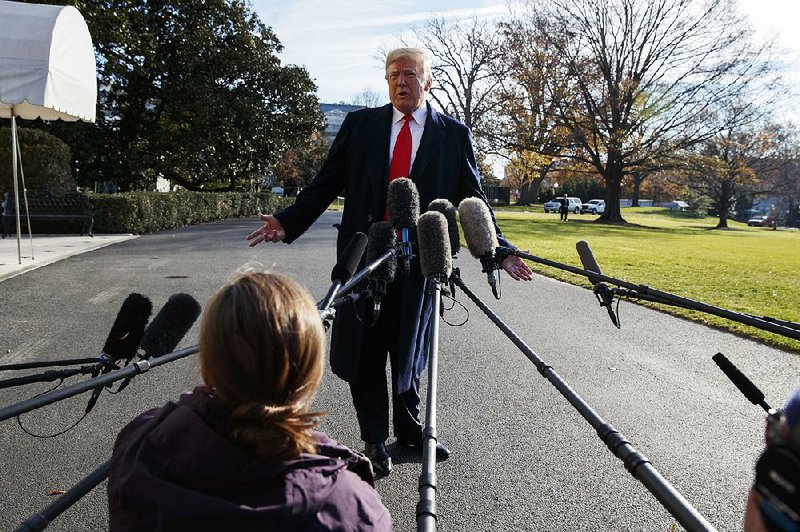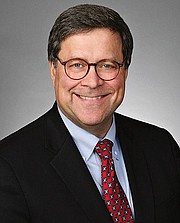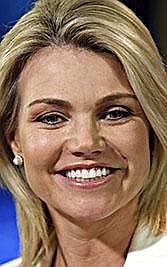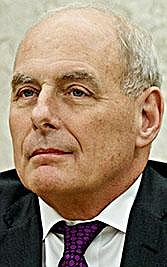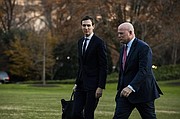WASHINGTON -- President Donald Trump on Friday said he intends to nominate William Barr, who served as attorney general during President George H.W. Bush's administration from 1991 to 1993, to return as head of the Justice Department.
"He was my first choice since day one," Trump told reporters as he walked from the White House to a helicopter for a trip to Kansas City, Mo. "He'll be nominated."
Trump praised the man he hopes will be his attorney general as having "demonstrated an unwavering adherence to the rule of law."
"There is no one more capable or qualified for this role," the president said at a Justice Department event in Kansas City. He predicted that his nominee would "probably get" bipartisan support.
Trump's focus on Barr, who supports a strong vision of executive powers, had emerged over the past week after the ouster last month of Jeff Sessions as attorney general and the turbulent reception that greeted his installation of Matthew Whitaker as the acting attorney general.
Trump also announced that Heather Nauert, the chief State Department spokesman, is his pick to be the next ambassador to the United Nations, replacing Nikki Haley, as the president began announcing some of the personnel changes he was expected to make after the midterm elections.
Nauert was a Fox TV anchor before being picked in 2017 to be the State Department's spokesman, and she will probably face skepticism from Senate Democrats for her lack of extensive political or diplomatic experience.
In another personnel move, John Kelly, the White House chief of staff, is expected to leave his post in the next few days, ending a tumultuous 16-month tenure that is still among the longest for a senior aide to Trump, two people with direct knowledge of the developments said Friday.
Kelly and Trump have grown weary of each other. But Trump, according to several senior administration officials and people close to him, has so far been unable to bring himself to personally fire a retired four-star general.
It is unclear who the replacement for Kelly would be. Nick Ayers, the vice president's chief of staff, is seen as a leading candidate. He is supported by Ivanka Trump and Kushner, who both serve as senior West Wing advisers and who, according to several officials, are trying to expand their influence internally and in Trump's re-election campaign.
VIEWS ON BARR
The choice of Barr was well received by Republicans as soon as it became known that he had emerged as permanent replacement for Sessions.
Sen. John Cornyn of Texas, the No. 2 Senate Republican, predicted that Republicans would be able to secure the votes needed to confirm him -- one of the highest potential hurdles for any Justice Department nominee given the ongoing special counsel investigation. Democrats and even some Republicans have said they would like assurances that Barr would let special counsel Robert Mueller's investigation proceed normally before voting to confirm him.
"He is the kind of person who could get confirmed," he said. "I think it is going to be challenging in any event."
Sen. Lindsey Graham, R-S.C., who will take over as chairman of the Senate Judiciary Committee next year, said in a statement that Barr is "highly capable, highly respected and will provide new and much-needed leadership for the Department of Justice."
"I will do everything in my power to push him through the Senate Judiciary Committee and onto the floor of the Senate for eventual confirmation as soon as possible," Graham said.
But parts of his record are likely to be closely scrutinized by Democrats. Barr has criticized aspects of the Russia investigation, including suggesting that Mueller hired too many prosecutors who had donated to Democratic campaigns. He also defended Trump's calls for a new criminal investigation into his 2016 opponent, Hillary Clinton, including over a uranium mining deal then-President Barack Obama's administration approved when she was secretary of state.
"There is nothing inherently wrong about a president calling for an investigation," Barr told The New York Times last year. "Although an investigation shouldn't be launched just because a president wants it, the ultimate question is whether the matter warrants investigation."
Barr added then that he saw more basis for investigating the uranium deal than any supposed conspiracy between Trump's associates and Russia.
"To the extent it is not pursuing these matters, the department is abdicating its responsibility," he said.
Three days after Trump fired FBI Director James Comey in May 2017, Barr wrote that it was "quite understandable that the administration would not want an FBI director who did not recognize established limits on his powers."
That piece was written before many of the details of Comey's private interactions with Trump became known.
It's not clear whether Barr, if confirmed, would take office in time to shape the Mueller investigation, which has shown signs of being in its final stages. But even if it wraps up before he takes office, Barr would be in a position to influence prosecutions stemming from the probe, as well as deal with other politically sensitive cases, such as responding to referrals from the House's new Democratic majority.
Barr's confirmation would create uncertainty about the future of Rod Rosenstein, the deputy attorney general who oversaw the Mueller investigation before Whitaker's appointment. Frequently, new deputies are also appointed when there's a new attorney general.
Sen. Susan Collins, R-Maine, said she wants assurances that Barr would allow Mueller's probe to continue.
"That would be one of the issues that I certainly would want to make sure, and that he recognizes that not only that Mr. Mueller has to be allowed to complete his investigation unimpeded, but also that prosecutorial decisions that are made by the department need to be independent," she said.
Sen. Jerry Moran, R-Kan., who chairs the Senate subcommittee that oversees funding for the Justice Department, said he, too, expected Barr to "let the investigation continue unimpeded."
Democrats were more forceful. Sen. Dianne Feinstein, D-Calif., the ranking minority-party member on the Senate Judiciary Committee, said in a statement that Barr "must commit to supporting Special Counsel Mueller's investigation and allowing him to follow the facts."
Sen. Charles Schumer, D-N.Y., said in a statement that Barr would "have a steep hill to climb in order to be confirmed by the Senate."
"Mr. Barr must commit -- at a minimum -- under oath before the Senate to two important things: First, that the Special Counsel's investigation will proceed unimpeded, and second, that the Special Counsel's final report will be made available to Congress and the public immediately upon completion," Schumer said.
In a brief phone conversation Friday, Barr confirmed he had accepted the president's offer but declined to comment further. A spokesman for the Senate Judiciary Committee said his confirmation hearing would not occur before the end of the year, given the limited time left before a new Senate takes over on Jan. 3.
A graduate of George Washington University's law school, Barr, 68, got his start in the 1970s working for the CIA and later worked in the Reagan White House before leaving for private practice. In 1989, Bush appointed him to lead the Justice Department's powerful Office of Legal Counsel, and later elevated him to deputy attorney general and then attorney general.
After the Bush administration, Barr spent most of his career as the top lawyer for the telecommunications company that became Verizon, from which he retired in 2008. He later joined the Kirkland & Ellis law firm.
In a November 1992 speech, Barr put forward the ideal of an attorney general whose primary loyalty is to the rule of law, not to the president who appointed him -- saying that he must provide "unvarnished, straight-from-the-shoulder legal advice" with no regard to political considerations like what conclusions the White House might prefer.
Still, he also said that in his experience, he confronted no conflicts between his duty to uphold the law and his policy allegiance to the president.
EXPERIENCE AN ISSUE
Nauert is also expected to face questions during her confirmation, mainly centering on her thin diplomatic resume. Nauert, 48, had little foreign policy experience before taking the podium as spokesman for the State Department.
In announcing his decision on Friday, Trump said Nauert was "very talented, very smart, very quick." He said he thought she would be "respected by all."
Others, including former U.S. ambassador to Russia, Michael McFaul, criticized the choice. Nauert's job as spokesman at State Department is "to read talking points and explain policy," McFaul tweeted. The job of U.N. ambassador is very different, he said, and usually requires foreign policy or diplomatic expertise or both.
Graham issued a statement praising Nauert, but his Republican colleagues who sit on the Senate Foreign Relations Committee were silent.
"I've known Heather for many years. She is a fine and capable person," Graham said, adding that she had the confidence of Trump and Secretary of State Mike Pompeo.
Sen. Jeff Merkley of Oregon, the top Democrat on a Senate subcommittee that oversees America's relationship with the U.N., slammed the nomination. He said Nauert lacks experience and that her loyalty to Trump and experience as an anchor on his favorite cable news network are insufficient qualifications.
If she gets the job, Nauert would take the post with less clout than Haley, a former South Carolina governor who announced in October that she would step down at the end of this year.
Trump is downgrading the ambassador's position to a sub-Cabinet-level post. That means Nauert could be overshadowed by Pompeo or Trump's national security adviser, John Bolton, who had the U.N. job in 2005 and 2006. She also would be going up against foreign counterparts like the U.N. representatives from Russia and China, who each have decades of experience in diplomacy.
Pompeo tweeted that Nauert has traveled with him since he took the helm of the State Department. "I have great confidence in her. Heather plays a key role in advancing U.S. foreign policy & I look forward to her speedy confirmation."
Information for this article was contributed by Charlie Savage and Maggie Haberman of The New York Times; by Matt Zapotosky, Devlin Barrett, Seung Min Kim, Karoun Demirjian, John Wagner and Erica Werner of The Washington Post; and by Michael Balsamo, Eric Tucker, Chad Day, Deb Riechmann, Jill Colvin, Zeke Miller and Darlene Superville of The Associated Press.
A Section on 12/08/2018
